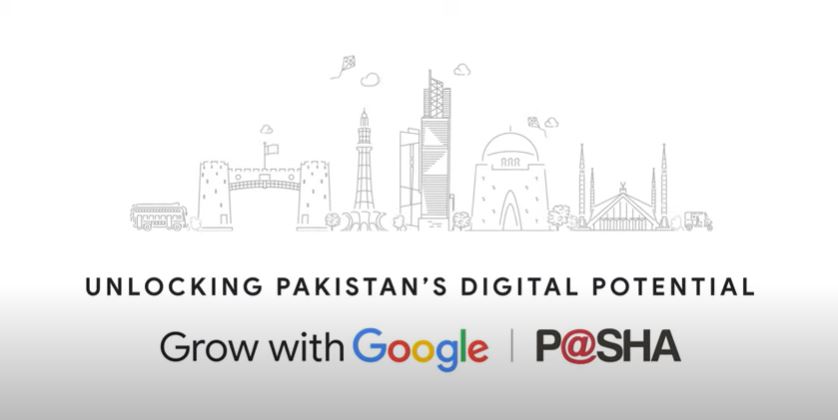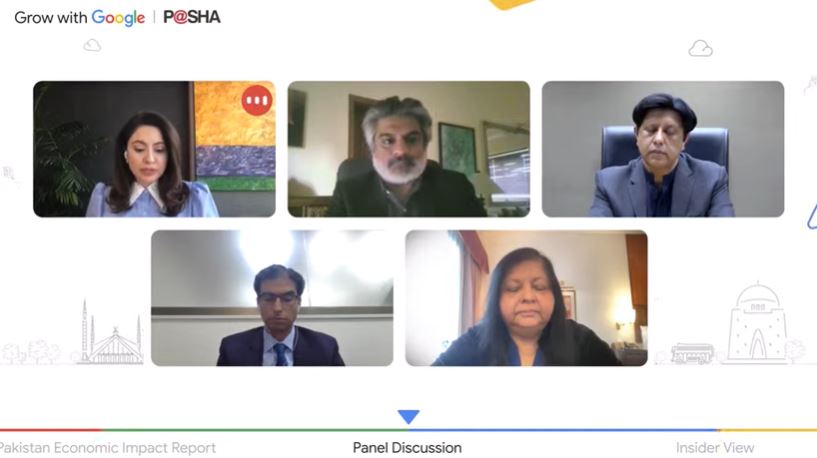Digital transformation can help Pakistan unlock up to Rs.9.7 trillion (59.7 Billion USD) in annual economic value by 2030, equivalent to about 19% of the country’s GDP in 2020, according to a new report commissioned by Google.
The report — released at a recent Google / P@SHA online event, “Unlocking Pakistan’s Digital Potential” – finds that Pakistan has a thriving technology sector. The country is home to more than 300,000 IT professionals, produces over 25,000 IT graduates annually, and has nurtured over 700 tech start-ups since 2010. Technology exports have grown 15% per year since 2020 and are expected to reach USD3.5 billion (Rs. 610,750,000,000) in 2022. Pakistan’s online population has grown rapidly and the internet penetration rate is reaching 54% in 2021.
Despite these many achievements, Pakistan can go further in its digital transformation journey. The report, prepared by economists at AlphaBeta, identifies three main pillars of action Pakistan could take to reach the projected growth opportunity. This includes developing infrastructure to support the local tech ecosystem, continuing to create a conducive environment for IT export, and promoting innovation and digital skills in the country.
There are eight key technologies that hold transformative potential for businesses and workers and can create significant economic value for Pakistan. These include the mobile internet; cloud computing; big data; AI; fintech; IoT and remote sensing; advanced robotics; and additive manufacturing.
Farhan Qureshi, Regional Director, Pakistan, Bangladesh, and Sri Lanka, Google, believes that despite the setbacks caused by the pandemic, the future for Pakistan’s digital economy is bright.
“Digital transformation is vital for Pakistan to address the long-term implications of the COVID-19 pandemic and build long-term resilience and growth. At Google, we aim to play our part by equipping Pakistanis with helpful products and tools, tech know-how, and online safety skills. Going forward, we will continue working with partners like P@SHA and the various government agencies to help fulfill the Digital Pakistan Vision” said the Country Director.
His Excellency Dr. Arif Alvi, President, Islamic Republic of Pakistan added
“I was encouraged to see AlphaBeta’s finding that digital transformation could create Rs. 9.7 trillion in annual economic value in Pakistan by 2030. Realizing this goal and the vision of Digital Pakistan will require a whole-of-nation approach, from both the public and private sectors. The efforts of groups like Google and P@SHA will be key. It is heartening to note that, according to AlphaBeta’s report, over 410,000 jobs are supported in Pakistan’s economy through the use of Google’s products.”
Badar Khushnood, Chairman Pakistan Software Houses Association (P@SHA) for IT & IT-enabled Services (ITeS) also shared,
“P@SHA represents thousands of technology companies and has been at the fore-front of the #DigitalPakistan revolution. Our industry has seen record-breaking growth over the last few years and we strive to take it to the next level. P@SHA envisions to unleash the potential of IT and ITeS industry in Pakistan from all perspectives! To stay true to our vision, we focus on leading the industry narrative. From policy advocacy to ecosystem enablement and in-depth research and insights, P@SHA interventions have had a significant impact over the last two decades.
P@SHA continues to work closely with relevant public and private sector stakeholders to not only accelerate growth in software and services exports but also fast-track digital transformation in domestic sectors of the economy as well. Google and P@SHA’s relationship continues to grow and we look forward to further strengthening this win-win synergy for Pakistan’s brighter and more vibrant digital ecosystem.”
Qureshi continued, “In order to be effective, digital transformation has to be inclusive. It is essential to make digital training opportunities accessible also to underrepresented communities and vulnerable groups. We recently launched a pilot program with the National Rural Support Programme to equip more Pakistanis with online safety skills and digital literacy and reached more than 1,000 students in just two months. Our Grow with Google programme has trained over 5,500 SMEs on how to leverage digital tools to support the development of a digitally skilled workforce.”
To download the full copy of AlphaBeta’s report, please access this link.






 PITB to implement HRMIS at NHMP and BOI: Agreements Signed
PITB to implement HRMIS at NHMP and BOI: Agreements Signed